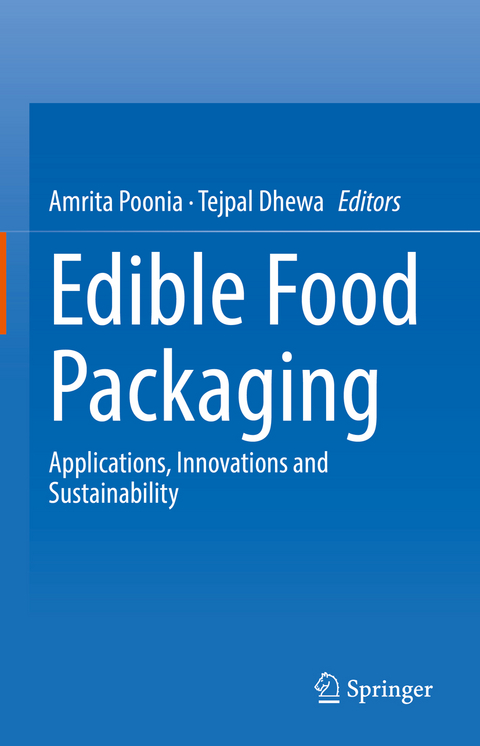
Edible Food Packaging
Springer Verlag, Singapore
978-981-16-2382-0 (ISBN)
As a world foreseeing food technology revolution, this book explores the unique topics in food packaging which possesses mammoth commercial applications and environmental potential.
This book discusses the various aspects of sustainable packaging edibles in food industry. It is divided into five main parts. The first section of the book addresses details of edible films, various sources, origin, scope and functions. Second section covers different sustainable alternatives such as seed gums, fruits and vegetable peels, sea weeds, fruits wastes, dairy by products & anti-oxidant edible packaging. This book also discusses about methods of improvements of mechanical properties of packaging edibles & their food applications, testing methods, innovations, limitations, challenges and nano edibles. It provides insights about the large quantity of wastes and by-products generated by food processing industries. Disposal of these wastes is a big problem due to their high biochemical oxygen demand (BOD) & chemical oxygen demand (COD) which causes severe problem of pollution to the environment. These wastes contain large amounts of proteins, carbohydrates, lipids, minerals, various bioactive compounds and have eco-friendly packaging potential. The book emphasizes on the fact that recycling these wastes as packaging edibles are sustainable and economical.
As a world foreseeing food technology revolution, this book explores the unique topics in food packaging which possesses mammoth commercial applications and environmental potential. Due to its immense scope, this book is highly useful for researchers, food scientists, students and food packaging industry experts.
Amrita Poonia is working as an Assistant Professor in the Department of Dairy Science and Food Technology, Institute of Agricultural Sciences, Banaras Hindu University, Varanasi, Uttar Pradesh, India. She has published two laboratory manuals, more than 15 book chapters at National and International level. Dr. Poonia has conducted/ offered a Massive Open Online Course (MOOC) under agMOOCs on Functional Foods: Concept, Technology and Health Benefits from (8 October, 2018 to 19 November, 2018) and awarded with the Certificate of Appreciation for offering a Massive Open Online Course (MOOC) under agMOOCs, by Commonwealth of Learning (COL) Canada. She has published more than 50 publications in esteemed National and International Journals. She has successfully completed a project on “Identification of Food borne pathogen (Listeria monocytogenes) in Shrikhand Using PCR (Polymerase Chain Reaction)” at BHU & supervised 2 Ph.D scholars, 28 M.Sc students and 2 Ph. D scholars are perusing theirresearch under her supervision. Tejpal Dhewa is a faculty in the School of Life Sciences, Central University of Haryana, Mahendergarh. He is the Coordinator, Food Safety Training and Certification (FoSTaC) Centre, Food Safety and Standards Authority of India (FSSAI), and University SWAYAM Coordinator- Central University of Haryana. Dr. Dhewa is a Course Coordinator of SWAYAM UGC MOOC on “Food Microbiology and Food Safety”. Dr. Dhewa has a diverse industrial, teaching, and research experience. He has published his research works in national and international journals. Dr. Dhewa also supervised several master’s theses/dissertations. He has successfully completed DU innovation project (2013-2015), and conducted short-term courses on “Food Safety, Food Security, and Food Regulations: A Primer” from September 16-20, 2018; “Metabolomics in Food and Nutrition Science Research: From Concepts to Applications” from February 15-19, 2019. “Food Fortification and Human Health: From Concepts to Public Health Applications” from September 9-13, 2019 under the Ministry of Human Resource Development (MHRD).
Chapter 1. Packaging Edibles: An Overview.- Chapter 2. Sources, Origin and Characterization of Packaging Edibles.- Chapter 3. Animal and Plant-Based Edible Food Packaging for Perishable Foodstuff.- Chapter 4. Scope, Functions and Novelty of Packaging Edibles.- Chapter 5. Novel Microbial Sources of Packaging Edibles.- Chapter 6. Fruit and Vegetable Waste: A Taste of Future Foods.- Chapter 7. Potato Waste Based Packaging Edibles: A Sustainable Approach For Food Preservation.- Chapter 8. By- products Utilization of Fruits and Vegetables as Edible Packaging.- Chapter 9. Fruit Purees, Extracts and Juices: Sustainable Source of Edible Packaging.- Chapter 10. Edible Films and Coatings for Fruits and Vegetables: Composition, Functions and Regulatory Aspects.- Chapter 11. Milk Protein Based Edible Coatings: Properties and Applications.- Chapter 12. Sea -weeds: New Source of Packaging Edibles.- Chapter 13. By-products of Oilseeds Industry (Defatted Cake Waste): Biodegradable Alternatives for Plastics.- Chapter 14. Seed Gums: Sources, Applications and Recent Trends in Edible Films.- Chapter 15. Edible Packaging: A Review On Packaging Strategy Through Novel Sources, Processing Techniques and Its Sustainability.- Chapter 16. Nanosized Additives for Enhancing Storage Quality of Horticultural Produce.- Chapter 17. Edibles Packaging: Mechanical Properties and Testing Methods.- Chapter 18. Methods for the Improvement of Barrier and Mechanical Properties of Edible Packaging.- Chapter 19. Multifunctional Edibles and their Applications in Food Industry.- Chapter 20. Packaging edibles: New Challenges and Regulatory Aspects.- Chapter 21. Edible and Oral thin Films: Formulation, Properties, Functions and Application in Food Packaging and Pharmaceutical Industry.- Chapter 22. Consumer Acceptance to Commercial Applications of Packaging Edibles.- Chapter 23. Recent Trends in Packaging.- Chapter 24. Edible Packaging of Liquid Foods.- Chapter 25. Nanoedibles: Recent Trends and Innovations.- Chapter 26. Edible Packaging: A Vehicle for Functional Bioactive Compounds.- Chapter 27. Antimicrobial Edible Packaging: Applications, Innovations and Sustainability.- Chapter 28. Antioxidant Rich Edible Packaging.-
| Erscheinungsdatum | 04.03.2022 |
|---|---|
| Zusatzinfo | 1 Illustrations, black and white; XXIX, 545 p. 1 illus. |
| Verlagsort | Singapore |
| Sprache | englisch |
| Maße | 155 x 235 mm |
| Themenwelt | Naturwissenschaften ► Biologie ► Mikrobiologie / Immunologie |
| Technik ► Lebensmitteltechnologie | |
| Technik ► Umwelttechnik / Biotechnologie | |
| ISBN-10 | 981-16-2382-1 / 9811623821 |
| ISBN-13 | 978-981-16-2382-0 / 9789811623820 |
| Zustand | Neuware |
| Haben Sie eine Frage zum Produkt? |
aus dem Bereich


